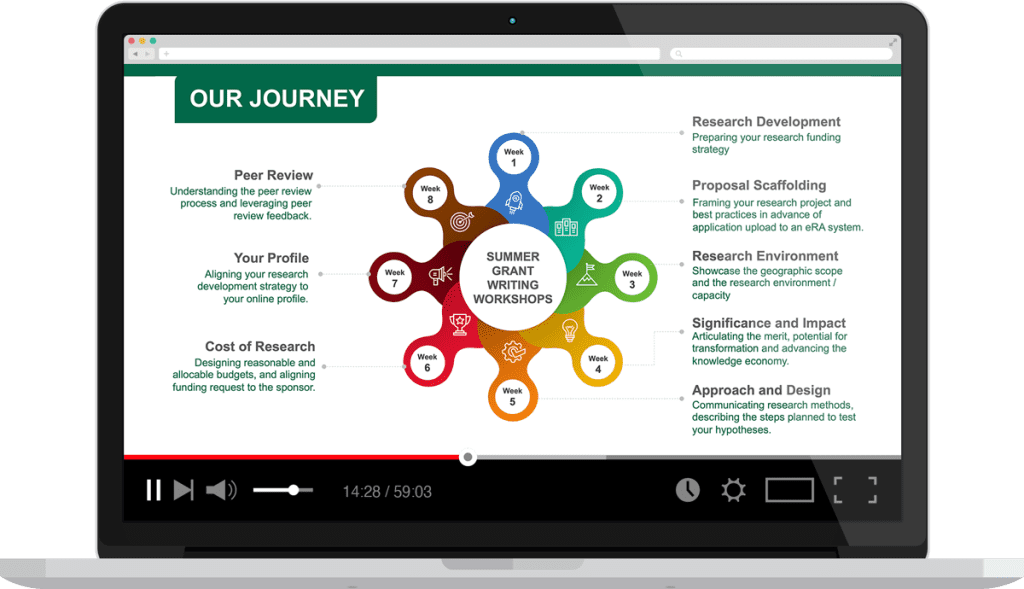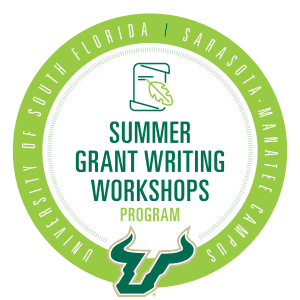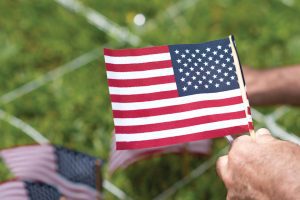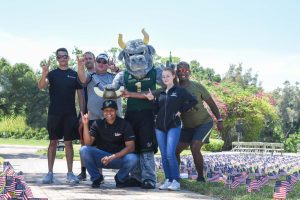

VIRTUAL ACCESSIBILITY EXPANDS THE USF SARASOTA-MANATEE CAMPUS-BASED PROGRAM TO 120 INSTITUTIONS WORLDWIDE
By Melanie Bass


After a successful virtual launch of its Summer Grant Writing Workshops professional development program in 2020 due to COVID-19, the University of South Florida once again offered it online for 2021.
The results were record-breaking.
More than 850 scientists, researchers, faculty and students representing 120 unique institutions from around the world participated in an eight-week, 16-session program that outlined the grant life cycle from the basics of the application process to develop competitive proposals.
That’s twice as many as the 2020 Summer Grant Writing Workshop, via Zoom with asynchronous participation.
The 2021 program featured 15 invited speakers including David Shifler, Office of Naval Research; Christina Payne, National Science Foundation; and Alison Gammie and William Elwood from that National Institutes of Health. Clinical researchers, graduate students and postdocs have long been a part of the program’s target audience, but 2021 marked another milestone as for the first time there were also a number of participants from community colleges, public school systems and charter schools, libraries and foundations.
“While we’re excited at the opportunity to engage such a large, diverse and talented group of researchers, we shouldn’t be surprised that the turnout was so remarkable,” said Sandra Justice, director of the Office of Research at the USF Sarasota-Manatee campus and facilitator of the annual program. “Research is a passion founded in a hunger to understand – to answer the big questions – and the world was changing rapidly. To be armed with effective knowledge and advanced skills to secure the funds to conduct that research is more important than ever.”
In addition to understanding the application process and development of competitive proposals, other topics as part of the program included how and where to apply for federal grants, private foundation funding, endowments and fellowship opportunities.
“Grant writing is a specialized genre of writing that is distinct from other academic writing. Pitching high-risk, high-reward ideas in a competitive marketplace requires a distinct skillset in which first-person storytelling and the process-oriented technical writing are brought together. Learning good grantsmanship may begin with proposal development, but it is much more than that.”In fact, effective grantsmanship is integral to professional development, especially for tenure-seeking faculty at a research-intensive university. The time commitment required to develop a competitive federal proposal is significant, upwards to 120 hours for the initial submission, and another 85 hours to revise and resubmit. For an early career faculty, research is a requirement for tenure in addition to teaching, publishing, mentoring and service. Unpacking the grant application elements and submission process is key as faculty work toward their research funding goals.
The program, launched by USF College of Arts and Sciences almost 20 years ago, an in-person program designed strengthen grantsmanship skills and cultivate collaborations. Homed on the USF Sarasota-Manatee campus since 2017, the program has enhanced their offerings and amplified the impact. The 2021 cohort included participants from academic institutions such as the University of Michigan, Georgia State University, UCLA, Embry-Riddle Aeronautical University, Miami University and Florida International University, and had a global reach that included Canada, China, India, Pakistan, Russia and Spain.
Participants earn a digital badge, completing weekly quizzes to validate learning. This program will hone grantsmanship skills and provide insight to the peer review process. Many leverage this course to draft their proposal, earning a course certificate and gaining valuable feedback in the program’s peer review process. There was an impressive breadth and depth to the 2021 draft proposals ranging from the NIH K-to-R01 and NSF CAREER proposals to advance health outcomes and integrate technology, as well as projects to improve education outcomes across diverse populations.
“The core objectives of the grantsmanship training are to advance understanding of the art and architecture of preparing a clear, comprehensive and compelling research proposal,” Justice said. “Researchers have a pioneering spirit, and effective grantsmanship training further prepares them to be at the forefront as thought leaders and innovators.”



